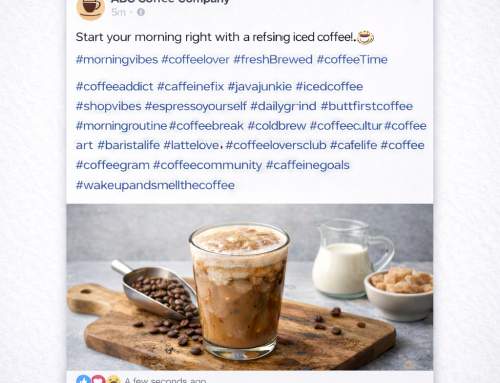
Protect Yourself Against Facebook And Instagram Hackers!
🚨 WARNING: Meta Business account hacking is undoubtedly on the rise.
Protect your Facebook and Instagram accounts from hackers: follow our 3 easy tips to safeguard your accounts! Also discover how and why hackers target Facebook and Instagram Business accounts and learn how to sort through what’s legit (and what’s not) because you don’t want to fall prey to the logistical nightmare of a locked account and stolen credit cards.

According to Meta’s transparency reports, more than 77% of Internet users, approx. 3.59 billion people, are active on at least one Meta platform. It’s no wonder why hackers target Meta users: there’s plenty to choose from.
How Hackers Access Your Facebook And Instagram Accounts
First, the hacker starts by breaking into your personal account. This gives them access to your business manager account, your company page, your personal and company IG, etc. Then the hacker locks you out by changing the passwords and the email for the account. In addition, they will often change the name of your page to something like “Meta Copyright Infringement” so that they can scam other accounts with your profile. Following this, they proceed to remove all unsecured admins and editors from the accounts so that no one else can access it. Furthermore, they hack any credit card information in the account, screw up your credit, and potentially drain your bank account.

Meta reported that an estimated one million users may have had their accounts compromised by hackers in 2022.
A lead fraud and security analyst at Javelin Strategy & Research also warns that once a hacker has your password, they’re extremely likely to use it to breach your other online accounts, too, to see if you made the mistake of using the same password (or a version of it) other places. Finally, they lock up the account or deactivate it. Occasionally, hackers will be true pirates and demand a ransom to give it back. You can safeguard against hackers by knowing how to recognize spam and scam messages in the first place!
Recognizing Scams & Safeguarding Against Facebook And Instagram Hackers
A good offense is important when it comes to cyber security. While not all scam or spam messages will contain these signs of fraud, they’re important to be aware of and to recognize.

According to Forbes, AI has supercharged scammers abilities to convince consumers of their authenticity: “Scammers now have flawless grammar, just like any other native speaker.”
Tell-Tale Signs of Spam and Scams:
- The message is urgent and threatens to deactivate your account or some other perilous action.
- The sender tells you to click on a link to reinstate your page, fix something, etc. They urge you to act now or pay now.
- It appears to be from a familiar organization and may even use a legit looking profile photo in an attempt to humanize who they say they are.
- Message may include misspellings, incorrect grammar, or duplicate lines of text.
- The hacker contacted you via messenger for Facebook or Instagram about the problem.
- The email you’ve received is from an email account that does not include one of the official Meta handles (see below).
- You received a notification to you profile about the problem.
- They have commented on a post or photo telling you about your violation.

Notifications and Comments:
Don’t be fooled by notifications or comments. Facebook and Instagram WILL NOT leave you comments or notify you via notifications about an account issue. They will email you.
If you see a notification to your profile from “Meta Infringement” or the like, definitely ignore it. If you click over to the page notifying you, it’s likely a page with zero likes or followers. The page was created to mislead you into thinking it’s a threat because it pops up in your notifications in bold. Also, any comments on a post indicating you’ve committed a violation are also complete garbage.

Direct Messages:
Unquestionably, messages in FB/IG Messenger or emails from “Facebook” or “Meta” telling you that you’ve committed copyright infringement or violated terms are total fakes. Facebook and Instagram will never send you direct messages about your account in the Instagram, Facebook, or Messenger apps to report violations.
What Messages Are Safe?
If the violation is legitimate, you will receive an email from a legit Meta handle.
Emails from the following handles should be safe to open:
- @support.facebook.com
- @support.instagram.com
- @facebookmail.com
- @mail.instagram.com
You can review any official emails from Facebook or Instagram in your account settings as well. If there’s nothing in there that matches what you’ve got in your inbox, it’s clearly a fake. While avoiding scams in the first place is ideal, following our 3 easy tips to safeguard your accounts against hackers provides even greater protection.
3 EASY Tips To Safeguard Against Hackers

Harvard University reports there are specific ways to create a solid password, including never using anniversary dates!
1. Strengthen and reset your passwords.
If you’re still using the same password for everything or using words in your passwords that anyone perusing your FB feed could guess are important or particular to you, then it’s time to step up your password game. This includes but isn’t limited to your kids’ names, dog’s name, your anniversary date, the name of your business, your AIM screen name from 2004, etc. Use a different secure password for each account. Keep them in a secure location (a post it note in your office at work is not secure and neither is a note or email to yourself on your phone) and change them when you suspect any kind of security breach. Ariel Askren of 574 Technologies says, “The current NIST cybersecurity framework states to use long, unique passwords or passphrases that are different for every service and never reused. Using a good password manager can help; you can securely save long, randomized passphrases without the need to remember them. All you need to remember is a single long, unique password to unlock the password manager. Just make sure you enable multi-factor authentication on that so it doesn’t get compromised.” Ariel recommends Keeper Security, Bitwarden, or 1Password as solid password managers you can trust.
2. Enable two-factor identification.
Turn on log-in alerts. I know it’s a pain, but it will save you a HUGE headache if it keeps you from being hacked and locked out of your accounts. Oh, and don’t share your one-time security codes, no matter what sob story someone sends you. This is one of the easiest and most important ways to safeguard your Meta Business accounts!
3. Secure more than one page admin!
There’s no sense in locking the front door if you don’t also secure the side door, too! Make sure you’re not the only admin on your business page. If you get locked out, and you’re the only admin, you’re out of luck. Have a second admin who you trust and will also use a strong password and have two-factor identification security settings turned on.
Now, The Most Important Rule to Safeguard Your Meta Business Accounts

The number one way to safeguard your Meta Business accounts against hackers is to never EVER click on links in potentially suspicious messages/emails. Even if they claim that you MUST do so to “retrieve” or “save” your account, even if you click on it and the page still looks legit: do not give any of your personal information! Do not “log in” on their linked page! If you do, say goodbye to your password; you’ll likely have just delivered it to the scammers. Follow our 3 easy tips to safeguard against hackers, and if you’re hesitant on the legitimacy of a message, err on the side of caution and delete it!
If You Find Spam/Scam Messages from Hackers
DO NOT RESPOND.
Report the content.
Block the scammer.
Delete the message!
If You’re Worried You’ve Been Hacked
If you cannot get into your account, use Facebook’s guide to secure it.
Suspicious someone else has been in your account? Use Facebook’s guided help tool.
Also, please alert your employees or anyone who has access to it/controls your accounts!
👇 Share our 3 tips to safeguard against hackers with any business owners or page admins you know. Take our advice: don’t become a victim, and look into managing your personal online data, too, to reduce your chances of being targeted. We’ve dealt with this before, and it’s highly unpleasant and absolutely devastating to your personal finances, let alone your business accounts.
We’ve Got You: Your Professional Safeguards
If you need knowledgeable, secure social media gurus to manage your Meta Business accounts, contact Slick Raven. We stay up to date with Meta’s never-ending security and account changes to ensure a secure and consistent presence for your business on socials.



